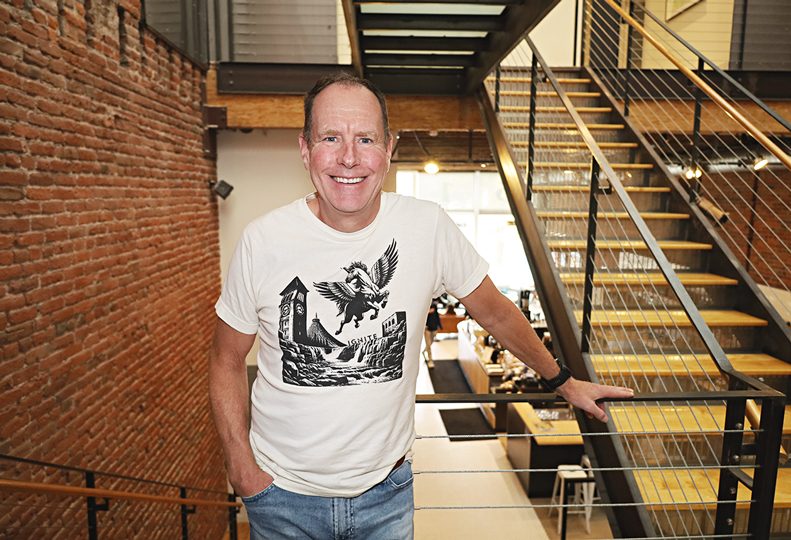
Home » Ignite Northwest shifts focus to incubating new startups
Ignite Northwest shifts focus to incubating new startups
Nonprofit will decrease number of annual events

Tom Simpson, CEO of Ignite Northwest, says the organization will decrease the number of events it hosts and will turn its focus on incubating startups.
| Karina EliasOctober 10, 2024
Ignite Northwest CEO Tom Simpson says the organization will reduce the number of annual events it puts on and instead focus its energies on incubating new companies through a new model dubbed Ignite Works.
The Spokane-based business accelerator, which traditionally has served as an information resource for startups, currently hosts between 16 and 20 events a year, an effort meant to highlight Spokane’s startup scene and boost its reputation as an innovation hub. However, it has not left much time to work closely with startups and help mentor entrepreneurs.
“We haven’t been able to get as involved as perhaps I would like us to,” Simpson says. “When we’re putting on and organizing these programs, that is time taken away from really rolling up our sleeves and doing all the things that are necessary to help build a company.”
The Ignite Works model partially emulates Seattle-based Pioneer Square Labs, a startup business incubator that helps establish startups and secure funding. Simpson says he was prompted to shift to this model of operating from others in the community who mentioned the need for a business incubator like Pioneer Square Labs.
Furthermore, Simpson reflected on some of the successful companies to which he devoted a considerable amount of time and energy and was further compelled to pursue a startup incubation model.
Such companies include Spokane-based retail and technology company etailz Inc., which Simpson co-founded with his Gonzaga students Josh Neblett and Sarah Wollnick, and Spokane-based Litehouse Health Inc., which developed an application with software that helps fill nursing shifts at local hospitals.
As reported by the Journal of Business, Ignite Northwest was established in 2015 as a private nonprofit organization funded with federal grants to assist businesses in their startup efforts. It is located on the second floor of the Hill Brothers Building at 518 W. Riverside, overlooking an Indaba Coffee LLC's downtown coffee shop. The organization has two full-time employees: Simpson and chief financial officer April Stoltz.
Ignite has seven board members including Simpson; Skye Henderson, vice president of venture investments at Cowles Ventures; Rick Repp, partner at Witherspoon Brajcich McPhee PLLC; Seven2 Inc. and 14Four Inc. co-founder Tyler Lafferty; Mark Gustafson, director of strategic investments at Avista Corp.; Moat Metrics Inc. president Richard Denenny; and Shelly Colomb, a vice president of commercial banking at U.S. Bank.
Moving forward, Ignite Works’ objective is to form, fund, and build new companies in the Spokane, Coeur d’Alene, and Sandpoint regions. The organization will begin to accept applications and review candidates quarterly but has not yet set a threshold for the number of startups it will accept. Ignite Works will formally be named as a founding partner in successful new businesses and will receive founder’s stock vested upon the closing of the company’s first round of funding.
Receiving compensation from startups will be a new component, Simpson says. Ignite Works intends to help companies build from the ground up and can share in the success of the company when it goes public, is acquired, or pays dividends, he says. There is no set amount or structure on how much stock Ignite will receive; each company will be reviewed on a case-by-case basis.
“We are aligned with the interest of the teams we’re working with who are putting in their sweat equity to build the company,” Simpson says.
Ignite Works will identify and vet ideas for new companies by regional entrepreneurs, assist in the creation of business plans, assist in recruiting key team members, advisers, and board members, develop a pitch deck, and secure initial funding, among other focuses.
Ignite Works has five consultants and a group of mentors stemming from CEOs of successful startups and angel investors to regional founders. The five consultants are Doug Forkner, Andrew Hite, Connor Simpson, Michael Williams, and James Youssef. Consultants will work closely with Simpson to help vet opportunities and analyze and evaluate a company’s capacity for growth. Mentors, which have not yet been determined, will be a step removed from the evaluation and analysis of granular details but can offer a higher-level input.
“I always view mentorship like friendship,” Simpson says. “Mentors are individuals that I can make available to some of these companies to provide higher-level guidance. … These mentors might be board members. Who knows?”
Latest News Technology Instagram
Related Articles
Related Products
Related Events


![Brad head shot[1] web](https://www.spokanejournal.com/ext/resources/2025/03/10/thumb/Brad-Head-Shot[1]_web.jpg?1741642753)


